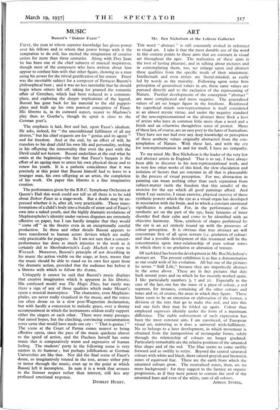Busoni's "Doktor Faust"
MUSIC
FAUST, the man to whom superior knowledge has given power over his fellows and to whom that power brings with it the temptation to do evil, has excited the imagination of creative artists for more than three centuries. Along with Don Juan he has been one of the chief subjects of musical inspiration, though most of the composers who have written about him appear to confuse him with that other figure, showing us a man using his power for the trivial gratification of his senses. Faust was the inevitable subject for a composer of Ferrucio Busoni's philosophical bent ; and it was no less inevitable that he should begin where others left off, taking for granted the romantic affair of Gretchen, which had been reduced to a common- place, and exploring the deeper implications of the legend. Busoni has gone back for his material to the old puppet- plays and built up his own poetical conception of Faust. .His libretto is, in its outward aspect, nearer to Marlowe's play than to Goethe's, though its spirit is close to the German poet's.
The emphasis is laid, first and last, upon Faust's idealism. He asks, indeed, for "the unconditional fulfilment of all my desires," but his chief requests are for "genius and its agony" and for freedom. And at the end, by an effort of will, he transfers to his dead child his own life and personality, seeking in his offspring the immortality that even the pact with the Devil could not bestow. Busoni underlines at the end what he omits at the beginning—the fact that Faust's bargain is the effort of an ageing man to arrest his own physical decay and to renew his youth. It is a pathetic coincidence that it was precisely at this point that Busoni himself had to leave to a younger man, his own offspring as an artist, the completion of his work. On paper this libretto is a fine imaginative creation.
The performance given by the B.B.C. Symphony Orchestra at Queen's Hall this week could not tell us all there is to be told about Doktor Faust as a stage-work. But a doubt may be ex- pressed whether it is, after all, very practicable. Those trans- formations of a child's body into a bundle of straw and of Faust's own into a naked youth, and the highly dramatic revelations of Mephistopheles's identity under various disguises are extremely effective on paper, but I can hardly imagine that they would "come off" in the theatre even in an exceptionally careful production. In these and other details Busoni appears to have transferred to human actors devices which are really only practicable for puppets. So I am not sure that a concert- performance has done as much injustice to the work as it certainly did to Shoshtakovitch's Lady Macbeth or even to Wozzeck. Moreover, Busoni's principle of not describing in his music the action visible on the stage, at least, means that the music should be able to stand on its own feet apart from the dramatic action, provided that the audience has before it a libretto with which to follow the drama.
Unhappily it cannot be said that Busoni's music displays that creative imagination which is apparent in his libretto. His confessed model was The Magic Flute, but rarely was there a sign of any of those qualities which make Mozart's opera a musical masterpiece. The characters, even Mephisto- pheles, are never really visualised in the music, and the voices too often drone on in a slow post-Wagnerian declamation, but with hardly a concession to melodic grace, over a thorny accompaniment in which the instruments seldom really support either the singers or each other. There were many passages that raised hopes, but the clinching, convincing consummation never came that would have made one cry : "That is genius ! " The scene at the Court of Parma comes nearest to being effective opera, since the pace of the music quickens almost to the speed of action, and the Duchess herself has some music that is comparatively warm and expressive of human feeling. The students' party in the following scene is very austere in its humour ; but perhaps jollifications at German Universities are like that. Nor did the final scene of Faust's doom, so imaginatively treated in the text, arouse either pity or terror through the music, even up to the point at which Busoni left it incomplete. In sum it is a work that arouses in the listener respect rather than interest, still less any profound emotional response.
DYNELEY HUSSEY.




































































 Previous page
Previous page